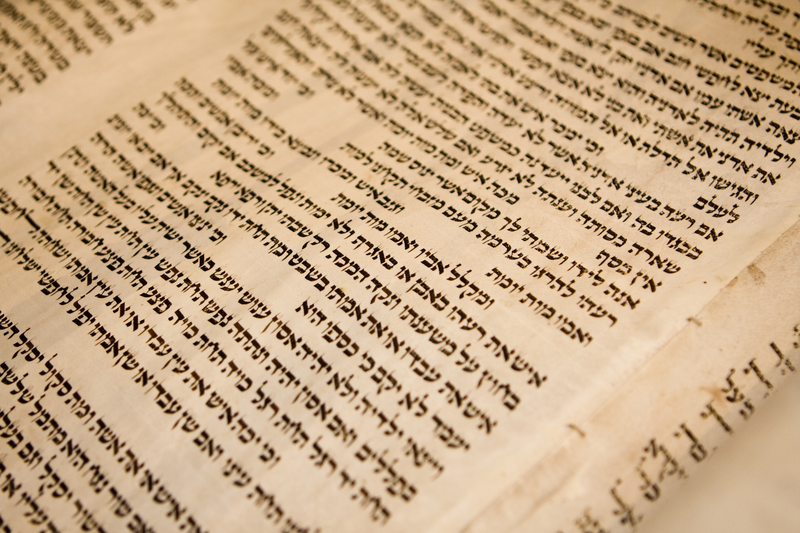
The Talmud in Berakhot (29-30) rules that one who sets out "laderekh - on the road", is required to say Tefilat Haderekh. The prayer beseeches that one be rescued from the hand of the enemy who may be lurking on the derekh. The blessing appears to assume that spiritual and possibly physical enemies are always to be found on the Derekh - road.
The idea that the "Derekh - the road" being fraught with danger was first noted by Yaakov in his prayer at Bet-El. "If Hashem will be with me...If he will protect me on the Derekh." In our Parasha, Yaakov rejects Reuven's offer to take responsibility for Binyamin and to return him safely back to his father. His response to the offer begins " His brother is dead...Something will happen to him on the Derekh - the road." Yaakov only appears concerned with a mishap that might occur "on the Derekh- road". He thereby preempted his rejection of the offer with "His brother is dead". Namely, I sent Yosef on the Derekh- the road, but he did not return. Furthermore, his mother Rahel died and was buried on the road to Efrat. In recounting this to his children Yaakov notes " Rahel had died on the Derekh - road."
In next weeks Parasha we see Yosef advising his brothers in the combatting of any evil that might befall them on the Derekh - road back to Canaan. As they were leaving Egypt he warns "Do not become angry or agitated on the Derekh- road." As anger and agitation amongst travelers can surely arouse the negative forces that lurk there.
The Yerushalmi (Shabbat 2:6) asks, On the Derekh -road? Yes! At home? No. From here it is derived that Satan attacks only at a time of danger." The Talmud apparently equates one's time on the Derekh - road with a time of danger. In fact, R. Yohanan is sighted in another Midrash and asserts that indeed "The Derekh- road is a place of danger."
Having no choice, Yaakov acquiesces to Yehuda's offer to take responsibility for Binyamin. We would have assumed that now the Torah would proceed to describe how Yaakov would attempt to arouse Divine forces to counter any adversarial forces by performing the misva to escort (Melave) them on the road. This would surely arouse protection for Binyamin prior to his travels. Hadn't Yaakov learned this from his grandfather Abraham who had escorted the Angels after their visit to him?
This time, however, it appears that Yaakov had opted for an alternative way of protection for them. The verse reads "Their father said to them...Take some of the land's famous produce in your baggage. A little balsam...and almonds." R. Yosef Hayyim (Od Yosef Hai - Mikets 4) sights Rabbenu HaAri (Sha'ar Kavanot) that the words and letters in this verse stated by Yaakov contain three holy names which offer protection from certain mishap. Evidently, Yaakov only felt confident to use this form of protection as opposed to (only) using the misva of escorting them.
The Yerushalmi explains that when Yaakov sent Yosef to inquire about the welfare of his brothers he had in fact offered his son protection and escorted him. Yaakov told Yosef that in the future the descendants will fail and not escort their guests to the outskirts of the city. This will expose the guests to the spiritual dangers of the Derekh - road and the guest will be killed. This would then require the Judges of the town to take a calf of cattle (Egla Arufa) and declare
"Our hands have not spilled this blood and our eyes did not see". In essence they were to say that the murdered one did not come within our presence and we did not send him off without food. Nor did we see him leave to go on his way without escort.
This is why Yaakov taught Yosef this law of Egla Arufa and escorted him on his way to search out the welfare of the brothers. However, according to the Sages, Yaakov was later troubled as he knew that the traveler and the escort are to be protected through this misva. They had left each other as proscribed by the Torah!
Why would tragedy have befallen Yosef on the Derekh if Yaakov had done the misva? Yaakov likely pondered that he might not have done the misva properly! Thereby exposing his son to the danger on the Derekh! Hence, the spirit of Yaakov had departed.
In next weeks Parasha we are taught that Yaakov saw the Agolot - Wagons which Yosef had dispatched. The Midrash explains that Yaakov had understood this to be a veiled reference by Yosef concerning the learning of the subject of Egla Arufa they had previously when Yosef had set off on the Derekh road to Shekhem.
It appears to me that Yosef was telling his father, that your misva of escorting me indeed had protected me! I was not injured! I had been sent to preserve Israel through these events. Do not be dismayed. The teaching of Abraham that one who escorts another will offer him protection on the Derekh - road is valid. The performance thereby of the Egla Arufa would not be necessary! Yosef is alive! Hence, Yaakov realized that the teaching of his Grandfather to escort one who sets out on the Derekh road was indeed effective. Upon realizing this the verse continues, "The spirit of Yaakov was revived."







